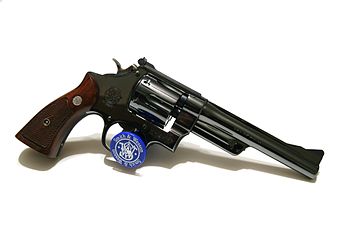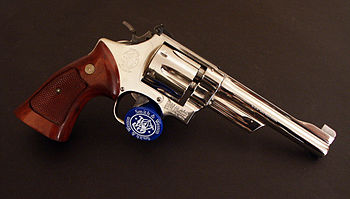Smith & Wesson Model 27
| Smith & Wesson Model 27 | |
|---|---|
 | |
| Type | Revolver |
| Place of origin | United States |
| Production history | |
| Manufacturer | Smith & Wesson |
| Produced | 1935–present |
| Variants | Model 327 (scandium) Model 627 (stainless steel) |
| Specifications | |
Barrel length |
|
| Cartridge |
|
| Action | Double-action |
| Feed system | Six-round cylinder |
| Sights | 3-dot, adjustable rear |
The Smith & Wesson Model 27 is the original .357 Magnum revolver. It was first produced in 1935, and many versions of it are still in production today. The Model 27 was built on Smith & Wesson's carbon steel, large N-frame, and was available at various times with 31⁄2", 4", 5", 6" or 83⁄8" barrel lengths and had adjustable sights.
Contents
1 History
2 Variants
2.1 Model 327
3 Current Production
4 References
History
When first introduced by Smith & Wesson in 1935, it was known as the Registered Magnum. The model was essentially a custom-order revolver. Barrel lengths could be had in quarter-inch increments from 3.5 to 8.75 inches in length. In addition to the different lengths of barrels available, there were different grips, front sights, triggers, hammers, and finishes available. Each Registered Magnum came with a certificate of authenticity.
Even though it was introduced in the middle of the Great Depression and was extremely expensive, Smith & Wesson found itself backlogged with orders for the four years that it produced the Registered Magnum. The Kansas City Police Department issued the Registered Magnum to its officers, and many other law enforcement officers across the United States carried the Registered Magnum. In 1939 Smith & Wesson stopped producing the Registered Magnum. It was replaced with the .357 Magnum. The .357 Magnum was available with barrel lengths of 3.5, 5, 6.5 and 8.75 inches. It has been reported that these were the most popular barrel lengths for the Registered Magnum. Essentially the .357 Magnum was still the Registered Magnum, but standardized for ease of production and economy. The Smith & Wesson Model 28 "Highway Patrolman" was introduced as a lower-cost version of the Model 27 in 1954, stripped of some of the features of the Model 27, such as polishing.
It was noted for its durability and reliability. The 31⁄2-inch barrel length was extremely popular with FBI agents from the 1940s through the 1960s. Skeeter Skelton considered the Model 27 with a 5-inch barrel as the best all-around handgun. General George Patton carried an ivory-handled Registered Magnum with a 31⁄2-inch barrel (along with his ivory-handled Colt Peacemaker); Patton called the Model 27 his "killing gun."[1]
Variants
| Smith & Wesson Model 27-2 6" | |
|---|---|
 --> --> | |
| Type | Revolver |
| Place of origin | United States |
| Production history | |
| Manufacturer | Smith & Wesson Performance Center |
| Specifications | |
| Weight | 37.6 oz |
| Length | 7.625 in |
Barrel length | 2.625 in |
| Cartridge | .357 Magnum & .38 Special |
| Action | Double action |
| Feed system | 6-shot cylinder |
| Sights | Dovetail Red Ramp front sight Outline White rear sight |
The stainless steel Model 627 was introduced in 1989 as the "Model of 1989". It featured a 5 1⁄2-inch barrel, a 6-shot unfluted cylinder, and had a round butt with S&W Combat stocks.
In 1996 the Smith & Wesson Performance Center began production of an 8-shot 627. The revolver has a 2.625-inch barrel with no muzzle brake or ports. The cylinder is unfluted. The revolver is made of stainless steel, with a matte finish and wood grips.
Model 327

M327PD
In 2008, the eight-shot, scandium-framed Smith & Wesson Model 327 was introduced. A variant of the 327, the 327NG, is part of the NightGuard line.
The Smith & Wesson Model 327PD is an 8-shot double-action revolver that has a 4-inch barrel with no muzzle brake or ports, made of a stainless steel. It has a scandium alloy frame and a titanium cylinder. It comes with rosewood Hogue grips. It uses a light-gathering HI-VIZ front sight and an adjustable V-notch rear sight. The revolver finish is a glare-reducing matte black, with a matte gray cylinder.[2]
The S&W TRR8 and M&P R8 (both incorporating tactical rails) are recent advances of the 327 line.
Current Production
Smith and Wesson now include the Model 27 in two variations in their current "Classics" Line of Revolvers. Both feature original style Wooden Combat Grips per the Post WW2 versions of the 27 and later 586 and 686, 38/357 Revolvers. Barrels are currently available in 4" and 6 1/2", they both feature adjustable sights. The 4" Version has a Pinned Serrated Ramp Style Front sight, the 6 1/2" version has a Traditional Target Patridge Style front sight that is also Pinned to the barrel.
References
^ Province, Charles M. (1982-12-01). The unknown Patton. Hippocrene Books. p. 41. ISBN 978-0-88254-641-4..mw-parser-output cite.citation{font-style:inherit}.mw-parser-output q{quotes:"""""""'""'"}.mw-parser-output code.cs1-code{color:inherit;background:inherit;border:inherit;padding:inherit}.mw-parser-output .cs1-lock-free a{background:url("//upload.wikimedia.org/wikipedia/commons/thumb/6/65/Lock-green.svg/9px-Lock-green.svg.png")no-repeat;background-position:right .1em center}.mw-parser-output .cs1-lock-limited a,.mw-parser-output .cs1-lock-registration a{background:url("//upload.wikimedia.org/wikipedia/commons/thumb/d/d6/Lock-gray-alt-2.svg/9px-Lock-gray-alt-2.svg.png")no-repeat;background-position:right .1em center}.mw-parser-output .cs1-lock-subscription a{background:url("//upload.wikimedia.org/wikipedia/commons/thumb/a/aa/Lock-red-alt-2.svg/9px-Lock-red-alt-2.svg.png")no-repeat;background-position:right .1em center}.mw-parser-output .cs1-subscription,.mw-parser-output .cs1-registration{color:#555}.mw-parser-output .cs1-subscription span,.mw-parser-output .cs1-registration span{border-bottom:1px dotted;cursor:help}.mw-parser-output .cs1-hidden-error{display:none;font-size:100%}.mw-parser-output .cs1-visible-error{font-size:100%}.mw-parser-output .cs1-subscription,.mw-parser-output .cs1-registration,.mw-parser-output .cs1-format{font-size:95%}.mw-parser-output .cs1-kern-left,.mw-parser-output .cs1-kern-wl-left{padding-left:0.2em}.mw-parser-output .cs1-kern-right,.mw-parser-output .cs1-kern-wl-right{padding-right:0.2em}
^ Jarrett, William S. (2009). Shooter's Bible. Skyhorse Publishing Inc. p. 110. ISBN 978-1-60239-801-6.
Taffin, John (1997). "Chapter 4 The .357 Magnum - The First Magnum". Big Bore Sixguns. Krause Publications. ISBN 0-87341-502-7.
| Wikimedia Commons has media related to Smith & Wesson Model 27. |
| Wikimedia Commons has media related to Smith & Wesson Model 327. |